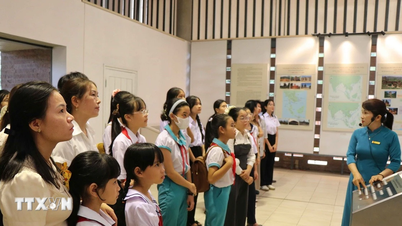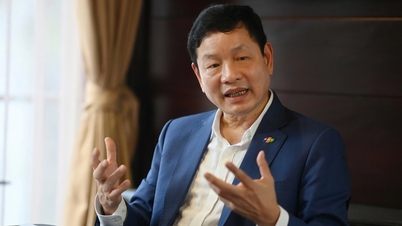The regulation to abolish school boards in public educational institutions in Resolution No. 71-NQ/TU on breakthroughs in education and training development of the Politburo is being supported by many educational managers in Thanh Hoa and is expected to be an effective step in streamlining management work.
The school council is defined as a governance institution to exercise the right to represent school ownership, monitor operations and orient development strategies. At each level of education, the role of the school council is established according to its own characteristics.
In public kindergartens and primary schools, the school council has the function of deciding on the direction of activities, mobilizing and monitoring resources, and ensuring the connection between the school and society and the community.
The council's members include representatives from many parties such as the Party Committee, trade unions, professional groups, local authorities, parents, etc. However, the current situation of school councils operating only in formality is happening in most educational institutions.

Resolution No. 71-NQ/TU has set out a specific policy: Not to organize school councils in public educational institutions (except for schools with international agreements), and at the same time implement the model of Party Committee Secretary concurrently being the head of the school.
According to Ms. Le Thi Ngoan, Principal of Ly Tu Trong Secondary School (Thanh Hoa province), in the context of the political system moving towards streamlining and effectiveness, the school council is a "bottleneck" in management work due to many shortcomings. Abolishing the school council in public institutions is in line with the actual situation.
According to some teachers, in reality, in general schools, the school council rarely plays a real decision-making role. Abolishing this institution will not destroy democracy, but on the contrary, help streamline the apparatus, focusing more on teaching expertise and student management.
Mr. Nguyen Ngoc Hai, Vice Principal of Ham Rong High School (Thanh Hoa province) also expressed his opinion: “For a long time, the School Council has been an administrative procedure and almost redundant, not effective. In schools, unlike administrative agencies, it mainly does professional work, so the head has the decisive factor. The Secretary who is also the head has better consistency, and the work is easier and more convenient. The current streamlining is very suitable.”
“The most problematic aspect of the school council is that it must include students, parents, local leaders, etc. When meeting, all members must be invited. However, it is not easy to convene a school council meeting each time. Some people can attend, some cannot, so it is very difficult, while it does not bring about any effectiveness. As for the head being the secretary, it is also very reasonable when the head has the deciding factor, all work will be more consistent,” said Ms. Ha Thi Thu, Principal of Ba Thuoc Secondary and High School.
From the educational practice at all levels, it can be seen that the policy of abolishing school councils in public educational institutions in the spirit of Resolution No. 71-NQ/TU is not only suitable for the practical context but also contributes to streamlining the apparatus, avoiding overlapping functions and tasks. This is a necessary adjustment step to improve the effectiveness and efficiency of management, while creating conditions for educational institutions to focus more on professional tasks, improve training quality and meet the requirements of innovation in the current period.
Source: https://baolaocai.vn/bo-hoi-dong-truong-bo-thu-tuc-mang-tinh-hanh-chinh-post881683.html




![[Photo] Science and Technology Trade Union honors exemplary workers and excellent union officials](https://vphoto.vietnam.vn/thumb/1200x675/vietnam/resource/IMAGE/2025/9/17/842ff35bce69449290ec23b75727934e)

![[Photo] General Secretary To Lam chairs a working session with the Standing Committee of the Government Party Committee](https://vphoto.vietnam.vn/thumb/1200x675/vietnam/resource/IMAGE/2025/9/17/cf3d855fdc974fa9a45e80d380b0eb7c)



































































































Comment (0)